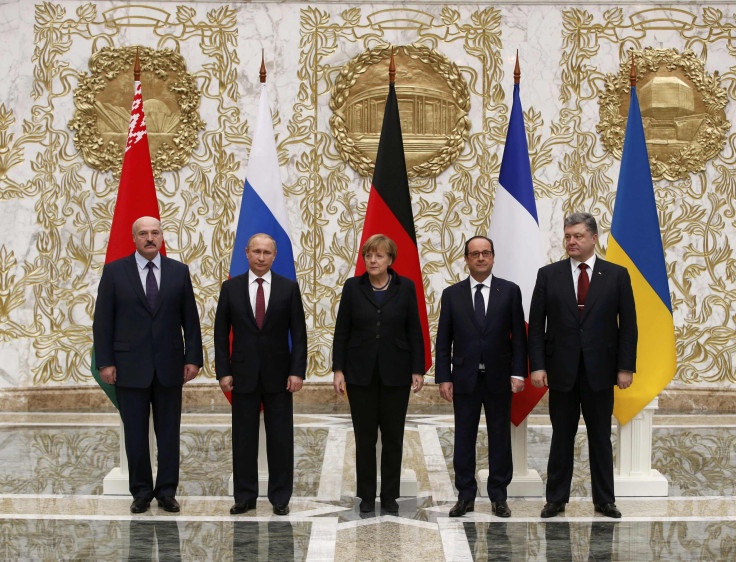Ukraine Crisis: Cease-Fire Deal Is A Fragile, Ambiguous Pact

Thursday’s ceasefire agreement for eastern Ukraine came as a result of a whirlwind of transcontinental diplomacy that ended in a deal signed after an all-night session in Minsk, Belarus, involving the leaders of Russia, Ukraine, France and Germany. But the eleventh-hour deal is a fragile pact that could very well unravel if leaders aren’t able to resolve the host of unresolved issues that remains.
The bleary-eyed Vladimir Putin, Petro Poroshenko, François Hollande and Angela Merkel emerged with a 13-point accord after 17 hours of negotiations, but Merkel made clear that the work was not over. “There are still major hurdles that lie ahead,” the German chancellor said in a statement Thursday, though she added there was “significantly more hope than if we had achieved nothing.”
The deal includes provisions to end the fighting and a roadmap toward a political settlement, including:
A cease-fire between Ukrainian and Russia-based separatist fighters effective at midnight, February 15
Pullout of heavy artillery from warzones within two weeks, starting February 17, monitored by the Organization for Security and Cooperation in Europe (OSCE)
Withdrawal of “foreign armed groups” (i.e., Russian fighters) from Ukrainian territory, and disarmament of “illegal groups
- Release of prisoners, with amnesty granted to those involved in fighting
- Constitutional reform granting “special status” for the disputed cities of Donetsk and Luhansk by the end of the year, after which Kiev will be able to reassert control over the Ukraine-Russia border
But several matters are still unaddressed, such as who controls Debaltsevo, a strategic transport junction that has been the site of intense fighting over the past week. Additionally, while the three-day window before the cease-fire comes into effect could allow for leaders to more effectively communicate disarmament and withdrawal plans to fighters on the ground, it also risks allowing separatists to escalate operations to gain more territory.
But the recent territorial gains by pro-Russia fighters also come into question. The agreement instructs Ukrainian and rebel fighters to withdraw heavy artillery from two separate frontlines of fighting: the current frontlines for Kiev’s forces, and another line demarcated in the September Minsk agreement for pro-Russian fighters. Kiev must eventually pass a law to grant “special status” to rebel-controlled territory in the east and demarcate borders based on the September agreement, but separatists’ military claim to additional territory could derail that plan.
A larger question persists over how the ceasefire will be monitored and enforced. The agreement provides few additional resources for the Organization for Security and Cooperation in Europe, the body tasked with monitoring the conflict, and analysts note the OSCE has already struggled with personnel and equipment shortages.
“Everything appears to be difficult about this deal,” said Eugene Rumer, director of the Eurasia and Russia Program at the Carnegie Endowment for International Peace. “If you want a deal of such complexity with the intensity that exists in the conflict there, ideally you’d want a more robust international presence to supervise and, if need be, enforce this cease-fire. That’s just not going to be the case if it’s only the OSCE.”
With so many unresolved questions over an immediate ceasefire, it’s difficult to imagine how Ukraine will make its way toward regaining border control by the end of the year. Poroshenko will need to convince the Ukrainian public to accept the terms of this agreement, as well as specifics for granting more autonomy to the disputed eastern cities of Donetsk and Luhansk. It won’t be an easy task. “It’s going to be a very contentious issue at home,” Rumer said. “He will be accused of selling out and betraying the national interest.”
“I really cannot imagine circumstances under which, even after elections are conducted, the government of Ukraine will be able to establish effective border control,” he added, calling it a “pie in the sky” idea as of this point.
“Today’s agreement is not a comprehensive settlement and certainly no breakthrough,” wrote German Foreign Minister Frank-Walter Steinmeier in a statement Thursday. “However, after weeks of violence, Minsk II could mark a step away from this spiral of military escalation and could lead to political impetus. If there is a chance of this happening then our efforts have been worth it.” The deal is known informally as Minsk II, in reference to a previous Minsk agreement, which was signed in September but in reality was not respected.
Rumer agreed that the deal, despite its ambiguities, is better than nothing -- for now. “But if it proves to be a disappointment, it will result in more fighting, more mutual recriminations, more calls to send weapons to Ukraine and counteractions,” he said.
© Copyright IBTimes 2024. All rights reserved.












